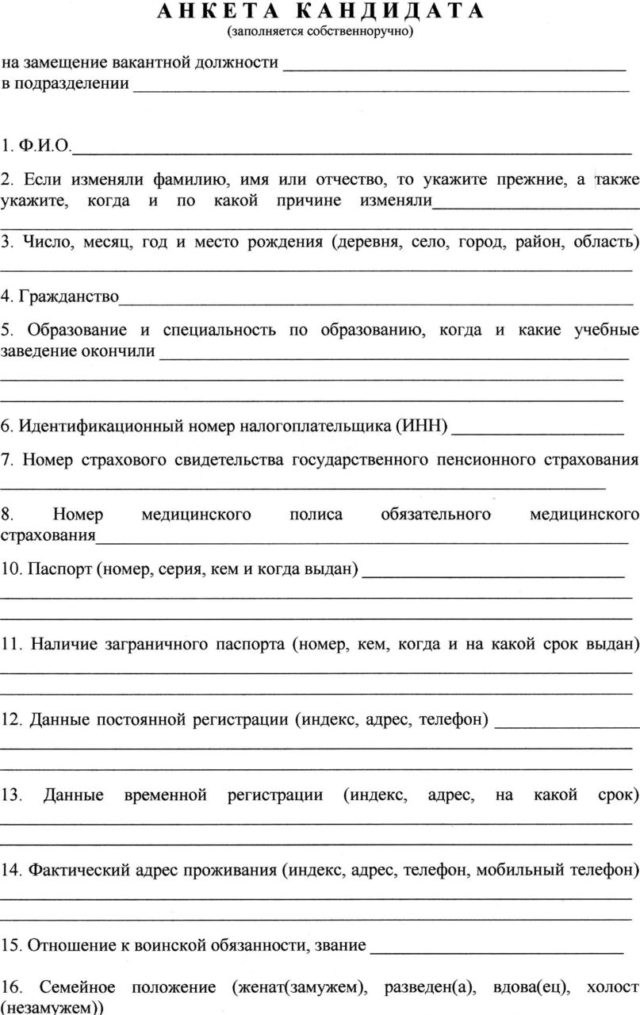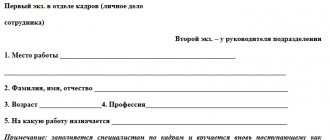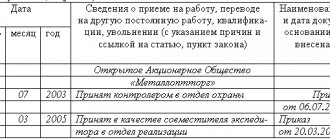What does the Security Service check?
The security service checks applicants according to several parameters, for which a certain set of measures is used within the framework of the law “on operational investigative activities.” First of all, employees check and control the following points:
- Screening candidates before hiring.
- Ensuring the safety of existing employees.
- Security of information that is a trade secret.
- Safety of enterprise property.
The purpose of the security service is to suppress possible economic problems and losses of the organization caused by both the actions of employees and the actions of competitors.
What do they pay attention to?
Personal conversation is an indispensable component of selecting candidates for a vacant position. The conversation should be structured in such a way as to establish a certain freedom and trust in communication.
During the interview, security officers focus on identifying information such as:
- cleanliness before the law;
- absence of bad habits;
- reasons for wanting to get a job with this particular employer;
- existing experience;
- further long-term plans (career, obtaining additional knowledge and advanced training, expectations regarding a financial bonus);
- reasons that prompted you to leave your previous place;
- existing personal and business connections;
- features of relationships with managers and colleagues;
- willingness to work overtime and travel, etc.
During the interview process, employees of such a structure pay attention to:
- features of intonation;
- speech style;
- gestures;
- facial expression;
- styles and figures of speech.
Inconsistency in a candidate's story about work experience may lead to the need for additional testing to check various personality components.
The interview may be conducted using a polygraph. The purpose of the verification using this method is to check the applicant’s honesty, resistance to stress, and ability to interact openly. A future employer does not have the right to force an applicant to undergo testing using such technical means. However, by refusing the proposed method of conducting the conversation, the candidate may lose the opportunity to find employment in a specific position.
By analyzing the candidates' answers, the following problems can be identified:
- lack of skill in presenting thoughts in a logical order;
- level of development of systems thinking;
- emotionality, degree of conflict;
- listening skills;
- degree of ambition, etc.
Employees of the department for which the person is applying may be involved in the interview process.
Getting a job in a commercial company
Large organizations have their own security service, most of whose employees are former officers or employees of law enforcement agencies and similar structures.
Additional responsibilities appear for this department: protection and protection of the interests of the organization, trade secrets, prevention of conflicts within the organization, prevention of thefts or other thefts. The actions of employees here are regulated by local acts adopted in the organization. It is difficult to say what the security service in such organizations is interested in and what it takes into account; it depends on the adopted acts, but there are basic points that always guide this service.
Mandatory criminal background check
First of all, the applicant is checked for the absence (presence) of a criminal record by sending a request to the appropriate government department.
This is done in order to understand whether the citizen being hired will have a negative impact on colleagues and the organization as a whole, and what can be expected from him. People who have been previously convicted of any criminal charges are practically not hired for administrative positions. Need to know! An expunged criminal record is not an obstacle to getting a job. It is permitted not to employ citizens with a criminal record only if the law prohibits the employment of people with a criminal record in your organization (Part 1 of Article 65 of the Labor Code of the Russian Federation).
Filling out the form
To simplify the verification procedures, the applicant for the declared vacancy fills out special questionnaires provided by the organization’s HR department, where he indicates the required information about himself. A prerequisite for admission is the citizen's written consent to the processing of personal data , after which the security service can begin checking the information received. If consent was not given, the organization will receive a fine in accordance with the Code of Administrative Offenses of the Russian Federation.
When applying for a job, security is not limited to a formal check of the submitted resume. Department specialists additionally check information about the status registered in psychoneurological and narcological dispensaries . Applicants of conscription age are checked for evasion of military service . The list of information to be verified depends on the direction of the organization’s activities.
Find out also how to pass a medical examination when applying for a job and what threatens the employer and employee in the event of unofficial employment.
Security service questionnaire sample:

How to verify the validity of the submitted documents
The employer may require documents based on Art. 65 Labor Code of the Russian Federation. The authenticity of the documents provided (passport, diploma, certificate, registration) will be examined by the security service. You can check the validity of the submitted documents on the websites of government agencies, for example:
- passport (civilian Russian Federation) is checked on the website of the Ministry of Internal Affairs;
- TIN is checked through the tax office website;
- a diploma or certificate of a specialist is verified by calling (or a written request) to the applicant’s educational institution;
- a person’s criminal record is checked through the court website;
- Judicial debt is checked through the FSSP website. You can also check there for the presence of administrative debts and open organizations in the name of the candidate;
- work experience is checked using the work book. Letters of recommendation from a previous place of work are also welcome, but today this is an exception to the rule rather than a general practice.
If there are doubts or for a more detailed check, the security service can call the place of previous employment, as well as ask questions to former colleagues and management. This is done in order to clarify the reason for dismissal and explain the relationship with the team. Sometimes they can tell about the character and morals of the employee, his resistance to stress, and draw up a psychological portrait.
Depending on the direction and scope of the company’s work, the candidate’s personal qualities can either prevent him from performing job functions or improve his performance. Some organizations also check the credit history of the future employee, as well as connections with competitors.
Interview with security service
Source: Rabota.ru
They will frighten you with harsh punitive measures for disclosing trade secrets, test your resistance to stress, and extract the smallest biographical details from you. At first it may seem like an interrogation. But in reality, it’s just an interview with the security service... A prestigious education and a rich track record, as you know, are not a 100% guarantee of getting a good job. Most employers have a number of requirements for candidates, in addition to professional knowledge and experience. Each applicant must be sociable, active, responsible, have an appropriate appearance and, of course, an impeccable reputation. “Take care of your dress again, but take care of your honor from a young age” - the old proverb is more relevant than ever for modern candidates. Any “stain” in your biography (be it a conflict with law enforcement agencies in adolescence, delays in loan payments, the presence of law-abiding relatives or alimony debt) can significantly complicate the search for work. Corporate guards in the form of security officers carefully guard candidates. They make inquiries about applicants, ask for characteristics, take recommendations, send requests to the relevant authorities and, of course, invite them to interviews.
And bring Lyapkin-Tyapkin here! Testing future employees for the “sins” of the past is becoming more and more popular every year. Increasing competition and ease of information transfer is forcing company management to seriously think about protecting trade secrets, assets, and unique production technologies. If a few years ago only applicants for management positions in banks or other large financial organizations received interviews with the security service, today even candidates for line positions in trading companies, restaurants and hotel chains are subject to thorough checks. “As before, an interview with a security representative is essential for commercial and financial directors, marketing and marketing communications directors, GR directors, IT directors, heads of technology departments of manufacturing companies, as well as employees with access to business information of strategic importance , says Tatyana Dolyakova, CEO of the recruiting agency Penny Lane Personnel. “The main goal of such an interview is to find out a number of questions regarding the candidate’s attitude to competitive intelligence, mastery of multimillion-dollar tenders, his “credit” histories, and connections with crime.” In addition, applicants for less senior positions are increasingly being forced to undergo testing. Experts from AVANTA Personnel (Adecco Group Russia) tried to list the specialists who are most often invited to undergo an additional interview: - warehouse workers: from managers to service personnel; — employees responsible for financial and production processes (accounting, finance); — employees involved in processing and supporting loans; — sales workers, especially those who have access to bonus schemes, working with large clients and networks; — technologists, production managers, laboratory workers; — employees of the purchasing department; — HR specialists: managers, employees involved in the formation of personnel policy. However, even if you are a representative of another specialty, do not think that your candidacy will be easily ignored by the security service. “In practice, it often happens that candidates do not undergo a personal interview with the security service, but the client company necessarily submits the applicants’ profiles for verification. Moreover, profile checks, as a rule, are carried out for all employees without exception, including low-level positions,” says Alexander Pakhomov, head of regional mass projects at Adecco Group Russia.
Without anger and bias The entire process of checking candidates can be divided into several stages. First, based on the applicant’s personal data, information is requested from the official authorities: whether the applicant is registered with a narcologist, whether he has been convicted, whether he has been brought to administrative responsibility, whether he is evading military service, etc. Next, information about his work history begins to be collected. Requests can be sent to the security services of those companies where the candidate once worked. Of particular interest to representatives of the service are the true reasons for dismissal, the presence/absence of financial abuse, and various types of fraud. After gathering the facts, security officers often organize the final stage of the review - an interview. “The structure of the interview, as a rule, is determined in advance; the nuances depend on the nature of the position,” say specialists from AVANTA Personnel (Adecco Group Russia). — Both direct questions and the method of analogies are used. If direct questions are used, the applicant will need to comment on the information received at the verification stage. The method of analogies involves identifying facts from indirect information. A candidate may be approached several times about the same topic, but from different angles, especially at a time when the applicant does not expect it. For example, they may “accidentally” place pictures on the table that evoke certain associations with an object or topic that may be of interest to security personnel. Questions are also asked, the purpose of which is to find out about the personal qualities of the candidate. A person’s behavior reveals activity, openness, willingness to cooperate, sincerity, controllability and other qualities.” “The information that security officers rely on when making a decision about a candidate can first of all be obtained during a personal meeting with the applicant,” says Sofya Muravyova, recruitment consultant at the consulting company. - This is “open” information that he himself provides about himself. Based on the answers, his psychological portrait is compiled. Some companies use a polygraph (lie detector) during such interviews.” According to specialists from AVANTA Personnel (Adecco Group Russia), the main purpose of a personal interview is to double-check all the information that the security service has. At the same time, the interpretation and final assessment are still subjective and depend on the specific person: “For example, in the candidate’s biography there is such a fact as criminal prosecution. In this case, the details are clarified: why the case was initiated, what was the position of the applicant, whether it was really his fault, or whether management used illegal schemes and shifted responsibility to the employee.” According to experts, such a detailed analysis, unfortunately, is not carried out by representatives of all security services: “Very often they give a refusal on formal grounds: a criminal or administrative offense, suspicion of participation in financial and legal schemes, theft, the fact of causing damage to the owner or information leaks."
The truth, the truth and nothing but the truth! An interview with the security service is usually the final stage of selection. Therefore, when you receive an invitation to this difficult interview, you can congratulate yourself in advance on your small victory. You are only one step away from the coveted position, and now all that is required of you is not to spoil the already formed impression. “The best recommendation is to treat a conversation with security service representatives as a standard interview,” comments Sofya Muravyova. “You just need to be prepared for the fact that the questions can be the most unexpected and sometimes of a personal nature. But in any case, your answers should be extremely honest, and your behavior should be as calm as possible. Otherwise, doubts may arise about your sincerity.” Specialists from AVANTA Personnel (Adecco Group Russia) also gave applicants some useful advice. - Say what you think is necessary, but don’t say anything superfluous - this will cause a new wave of questions. - Stay calm and confident. — Do not give in to provocations (former employees of the Ministry of Internal Affairs especially often use such methods). - Do not hide any offenses from the past - the interviewers are probably already aware of them as a result of a preliminary check. Such direct questions must be answered honestly, providing your comments. — Do not give inaccurate information on your personal data. — If you have any contacts with people who are facing criminal cases, but they are not your close relatives (for example, a former classmate or a friend’s husband), you are not required to provide such information on your own initiative at the interview. And most importantly, try, if possible, to make the most positive impression on the security officers. Their verdict, of course, is not the ultimate truth, but leaders are still inclined to listen to their opinion. Because employers believe that it is better to lose a professional than to hire a fraudster or spy.
When does the Security Service not let you through?
A negative response to the questionnaire can be due to objective reasons prescribed by law, or for personal reasons. In the second case, such refusal is considered illegal. There are often cases when the Security Council checks the personal pages of candidates on social networks, but this is not a reason for refusal. They cannot refuse because of the candidate’s qualities that are not related to the position held, as stated in Article 64 of the Labor Code of the Russian Federation. In fact, the security service can use the results of the check to identify the most suitable one from several candidates.
If a person does not agree with the decision of the security service, he has the right to challenge it in court, but in practice the employer will not lose anything; the court will only be able to satisfy compensation for moral damage. Often, the employer in such trials refers to “lack of business communication skills,” which is an unprovable argument, but a sufficient basis for refusing to hire. According to the law, this point is not regulated in any way.
For which positions are background checks performed?
Dear readers! The article talks about typical ways to resolve legal issues, but each case is individual. If you want to find out how to solve your particular problem , contact a consultant:
+7 (499) 938-81-90 (Moscow)
+7 (812) 467-32-77 (Saint Petersburg)
8 (800) 301-79-36 (Regions)
APPLICATIONS AND CALLS ARE ACCEPTED 24/7 and 7 days a week.
It's fast and FREE !
Often this procedure must be completed by people applying for special positions. They can be associated with material assets, confidential information, as well as processes that directly affect the functioning of the company.
Large companies that have their own security department usually screen every person who comes to them, regardless of their position and function.
List of persons who must go through this procedure:
- Employees whose activities involve financial transactions within the company. They must be subject to verification, since their illegal actions can cause economic damage to the company itself. This category includes people working in the following positions:
- HR department employees;
- Accounting department staff;
- company economists;
- people whose responsibilities are related to making changes to various financial documentation, as well as with special seals;
- technical department employees.
- Employees of departments dealing with economic and MTS (material and technical supply) issues. They contain a large amount of finances belonging to the company, as well as securities and confidential information.
The Security Service must ensure the safety of the company’s personal and commercial data and not allow it to be disclosed to third parties. This can lead to large financial losses, loss of competitiveness and loss of employee trust.








